Challenges and Strategies in Nursing Transition: NR 2 Assignment
VerifiedAdded on 2022/08/13
|9
|2497
|411
Essay
AI Summary
This essay examines the critical transition phase from student nurse to professional clinical practice, highlighting the challenges encountered by new graduates. The paper identifies communication issues with senior nurses, patients, and families, the impact of a blame culture within healthcare settings, and the burden of heavy workloads as significant obstacles. To address these challenges, the essay analyzes the effectiveness of self-care strategies, the importance of supportive work environments, and the role of enhanced learning opportunities. The discussion incorporates relevant literature to critically assess these strategies, emphasizing their potential to improve the transition experience and support new nurses in adapting to the demands of the healthcare workforce. The essay underscores the need for comprehensive support systems, including preceptorship, peer communication, and ongoing professional development, to ensure successful integration and promote the well-being of newly qualified nurses.
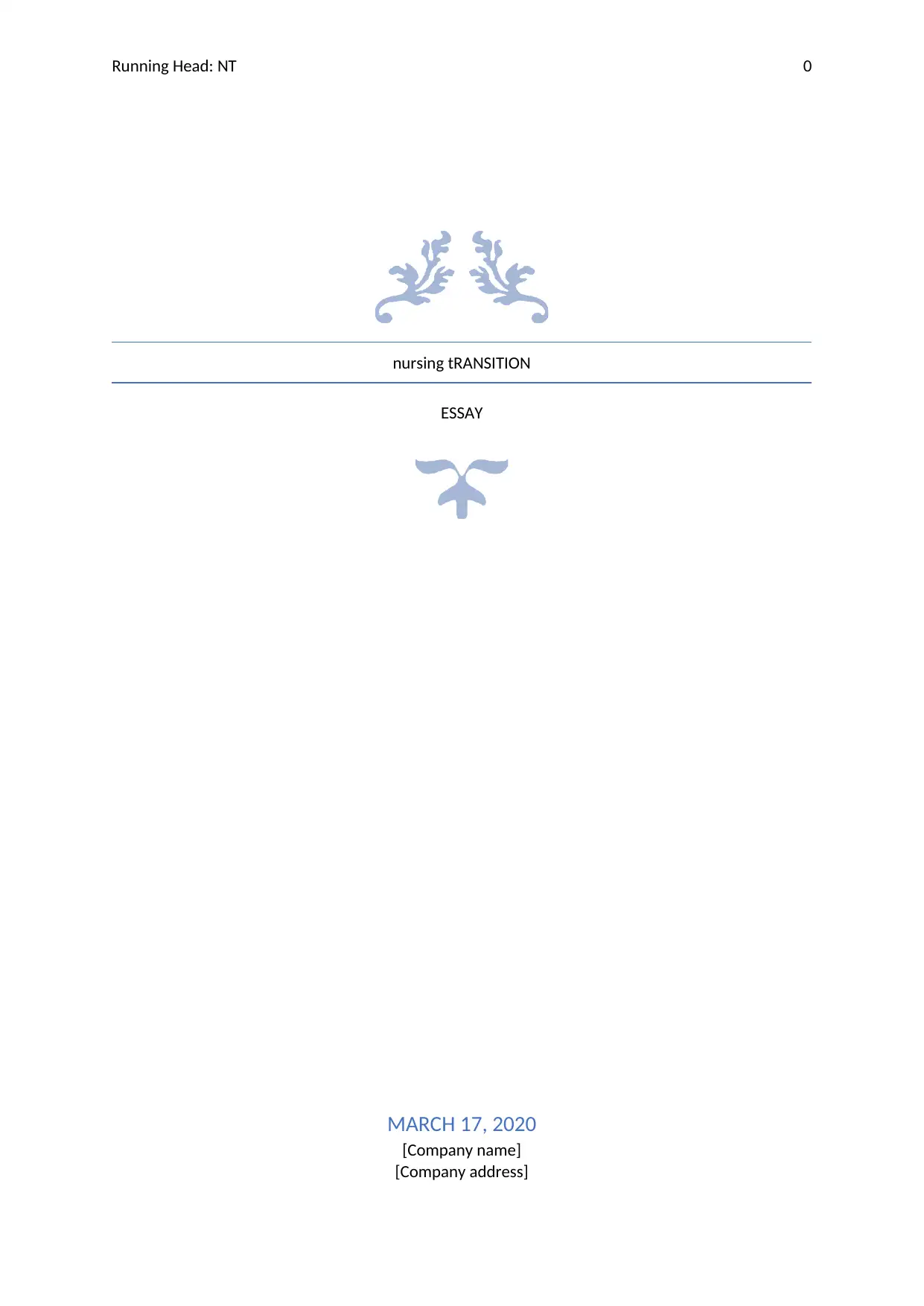
Running Head: NT 0
nursing tRANSITION
ESSAY
MARCH 17, 2020
[Company name]
[Company address]
nursing tRANSITION
ESSAY
MARCH 17, 2020
[Company name]
[Company address]
Paraphrase This Document
Need a fresh take? Get an instant paraphrase of this document with our AI Paraphraser
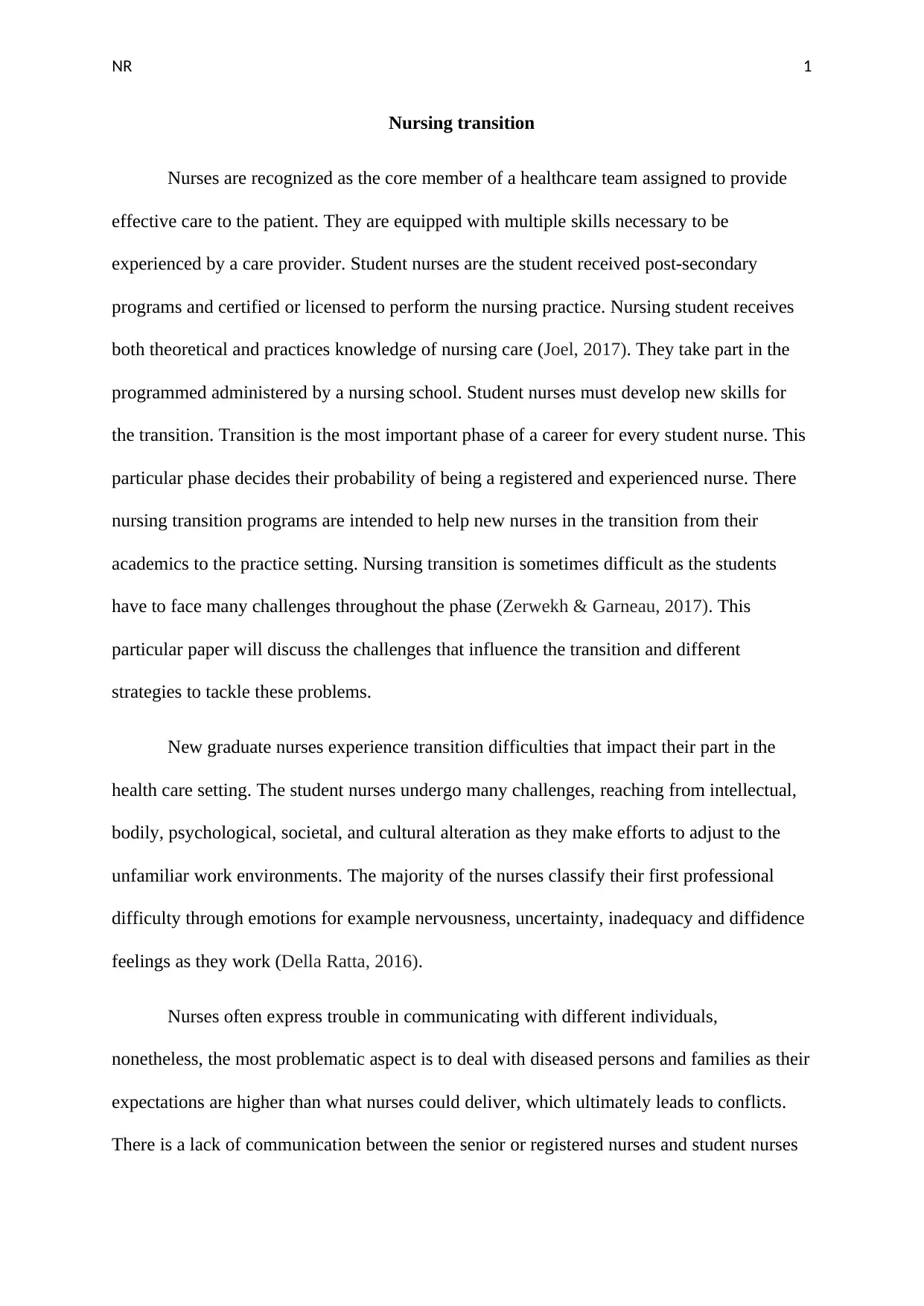
NR 1
Nursing transition
Nurses are recognized as the core member of a healthcare team assigned to provide
effective care to the patient. They are equipped with multiple skills necessary to be
experienced by a care provider. Student nurses are the student received post-secondary
programs and certified or licensed to perform the nursing practice. Nursing student receives
both theoretical and practices knowledge of nursing care (Joel, 2017). They take part in the
programmed administered by a nursing school. Student nurses must develop new skills for
the transition. Transition is the most important phase of a career for every student nurse. This
particular phase decides their probability of being a registered and experienced nurse. There
nursing transition programs are intended to help new nurses in the transition from their
academics to the practice setting. Nursing transition is sometimes difficult as the students
have to face many challenges throughout the phase (Zerwekh & Garneau, 2017). This
particular paper will discuss the challenges that influence the transition and different
strategies to tackle these problems.
New graduate nurses experience transition difficulties that impact their part in the
health care setting. The student nurses undergo many challenges, reaching from intellectual,
bodily, psychological, societal, and cultural alteration as they make efforts to adjust to the
unfamiliar work environments. The majority of the nurses classify their first professional
difficulty through emotions for example nervousness, uncertainty, inadequacy and diffidence
feelings as they work (Della Ratta, 2016).
Nurses often express trouble in communicating with different individuals,
nonetheless, the most problematic aspect is to deal with diseased persons and families as their
expectations are higher than what nurses could deliver, which ultimately leads to conflicts.
There is a lack of communication between the senior or registered nurses and student nurses
Nursing transition
Nurses are recognized as the core member of a healthcare team assigned to provide
effective care to the patient. They are equipped with multiple skills necessary to be
experienced by a care provider. Student nurses are the student received post-secondary
programs and certified or licensed to perform the nursing practice. Nursing student receives
both theoretical and practices knowledge of nursing care (Joel, 2017). They take part in the
programmed administered by a nursing school. Student nurses must develop new skills for
the transition. Transition is the most important phase of a career for every student nurse. This
particular phase decides their probability of being a registered and experienced nurse. There
nursing transition programs are intended to help new nurses in the transition from their
academics to the practice setting. Nursing transition is sometimes difficult as the students
have to face many challenges throughout the phase (Zerwekh & Garneau, 2017). This
particular paper will discuss the challenges that influence the transition and different
strategies to tackle these problems.
New graduate nurses experience transition difficulties that impact their part in the
health care setting. The student nurses undergo many challenges, reaching from intellectual,
bodily, psychological, societal, and cultural alteration as they make efforts to adjust to the
unfamiliar work environments. The majority of the nurses classify their first professional
difficulty through emotions for example nervousness, uncertainty, inadequacy and diffidence
feelings as they work (Della Ratta, 2016).
Nurses often express trouble in communicating with different individuals,
nonetheless, the most problematic aspect is to deal with diseased persons and families as their
expectations are higher than what nurses could deliver, which ultimately leads to conflicts.
There is a lack of communication between the senior or registered nurses and student nurses
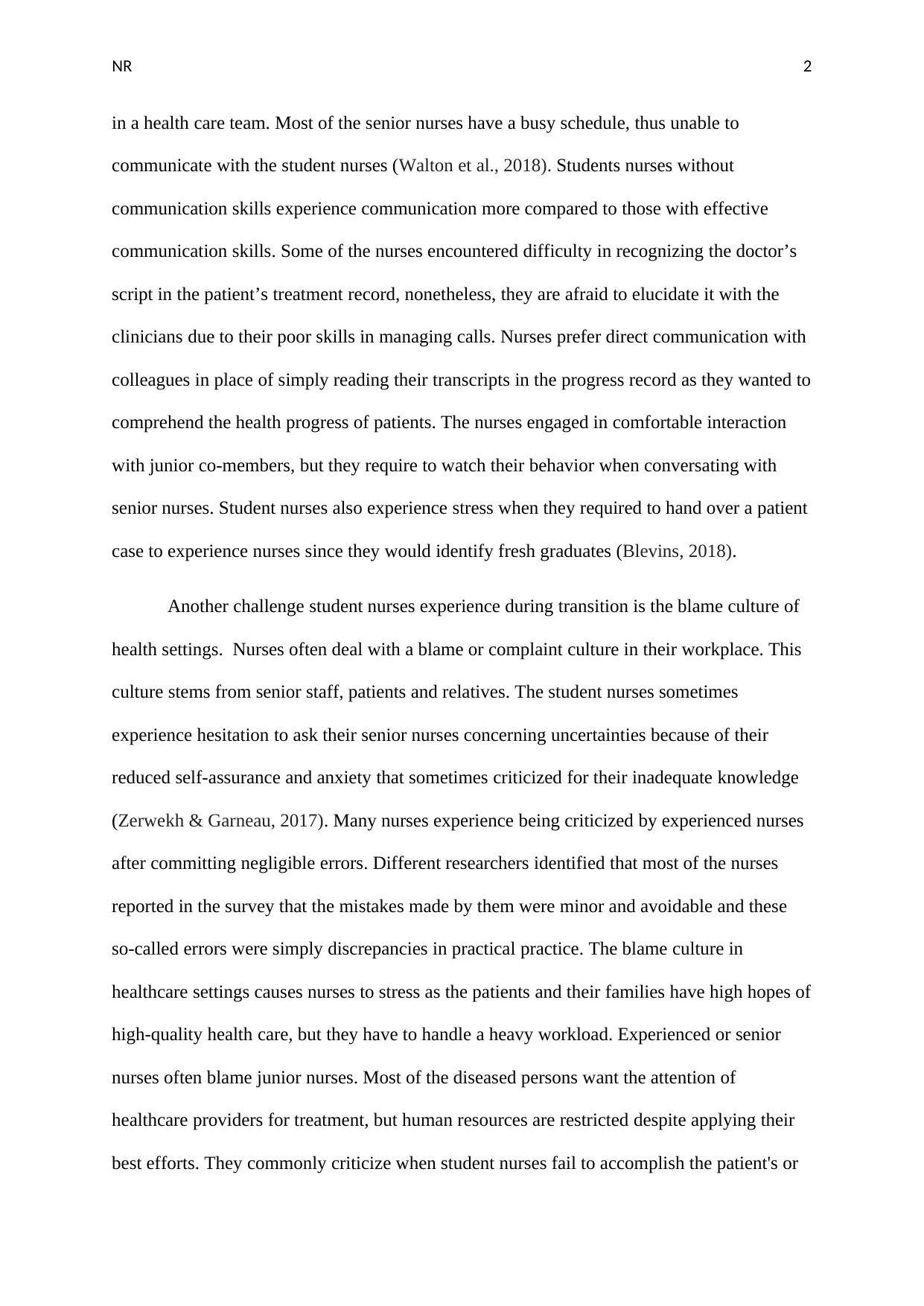
NR 2
in a health care team. Most of the senior nurses have a busy schedule, thus unable to
communicate with the student nurses (Walton et al., 2018). Students nurses without
communication skills experience communication more compared to those with effective
communication skills. Some of the nurses encountered difficulty in recognizing the doctor’s
script in the patient’s treatment record, nonetheless, they are afraid to elucidate it with the
clinicians due to their poor skills in managing calls. Nurses prefer direct communication with
colleagues in place of simply reading their transcripts in the progress record as they wanted to
comprehend the health progress of patients. The nurses engaged in comfortable interaction
with junior co-members, but they require to watch their behavior when conversating with
senior nurses. Student nurses also experience stress when they required to hand over a patient
case to experience nurses since they would identify fresh graduates (Blevins, 2018).
Another challenge student nurses experience during transition is the blame culture of
health settings. Nurses often deal with a blame or complaint culture in their workplace. This
culture stems from senior staff, patients and relatives. The student nurses sometimes
experience hesitation to ask their senior nurses concerning uncertainties because of their
reduced self-assurance and anxiety that sometimes criticized for their inadequate knowledge
(Zerwekh & Garneau, 2017). Many nurses experience being criticized by experienced nurses
after committing negligible errors. Different researchers identified that most of the nurses
reported in the survey that the mistakes made by them were minor and avoidable and these
so-called errors were simply discrepancies in practical practice. The blame culture in
healthcare settings causes nurses to stress as the patients and their families have high hopes of
high-quality health care, but they have to handle a heavy workload. Experienced or senior
nurses often blame junior nurses. Most of the diseased persons want the attention of
healthcare providers for treatment, but human resources are restricted despite applying their
best efforts. They commonly criticize when student nurses fail to accomplish the patient's or
in a health care team. Most of the senior nurses have a busy schedule, thus unable to
communicate with the student nurses (Walton et al., 2018). Students nurses without
communication skills experience communication more compared to those with effective
communication skills. Some of the nurses encountered difficulty in recognizing the doctor’s
script in the patient’s treatment record, nonetheless, they are afraid to elucidate it with the
clinicians due to their poor skills in managing calls. Nurses prefer direct communication with
colleagues in place of simply reading their transcripts in the progress record as they wanted to
comprehend the health progress of patients. The nurses engaged in comfortable interaction
with junior co-members, but they require to watch their behavior when conversating with
senior nurses. Student nurses also experience stress when they required to hand over a patient
case to experience nurses since they would identify fresh graduates (Blevins, 2018).
Another challenge student nurses experience during transition is the blame culture of
health settings. Nurses often deal with a blame or complaint culture in their workplace. This
culture stems from senior staff, patients and relatives. The student nurses sometimes
experience hesitation to ask their senior nurses concerning uncertainties because of their
reduced self-assurance and anxiety that sometimes criticized for their inadequate knowledge
(Zerwekh & Garneau, 2017). Many nurses experience being criticized by experienced nurses
after committing negligible errors. Different researchers identified that most of the nurses
reported in the survey that the mistakes made by them were minor and avoidable and these
so-called errors were simply discrepancies in practical practice. The blame culture in
healthcare settings causes nurses to stress as the patients and their families have high hopes of
high-quality health care, but they have to handle a heavy workload. Experienced or senior
nurses often blame junior nurses. Most of the diseased persons want the attention of
healthcare providers for treatment, but human resources are restricted despite applying their
best efforts. They commonly criticize when student nurses fail to accomplish the patient's or
⊘ This is a preview!⊘
Do you want full access?
Subscribe today to unlock all pages.

Trusted by 1+ million students worldwide
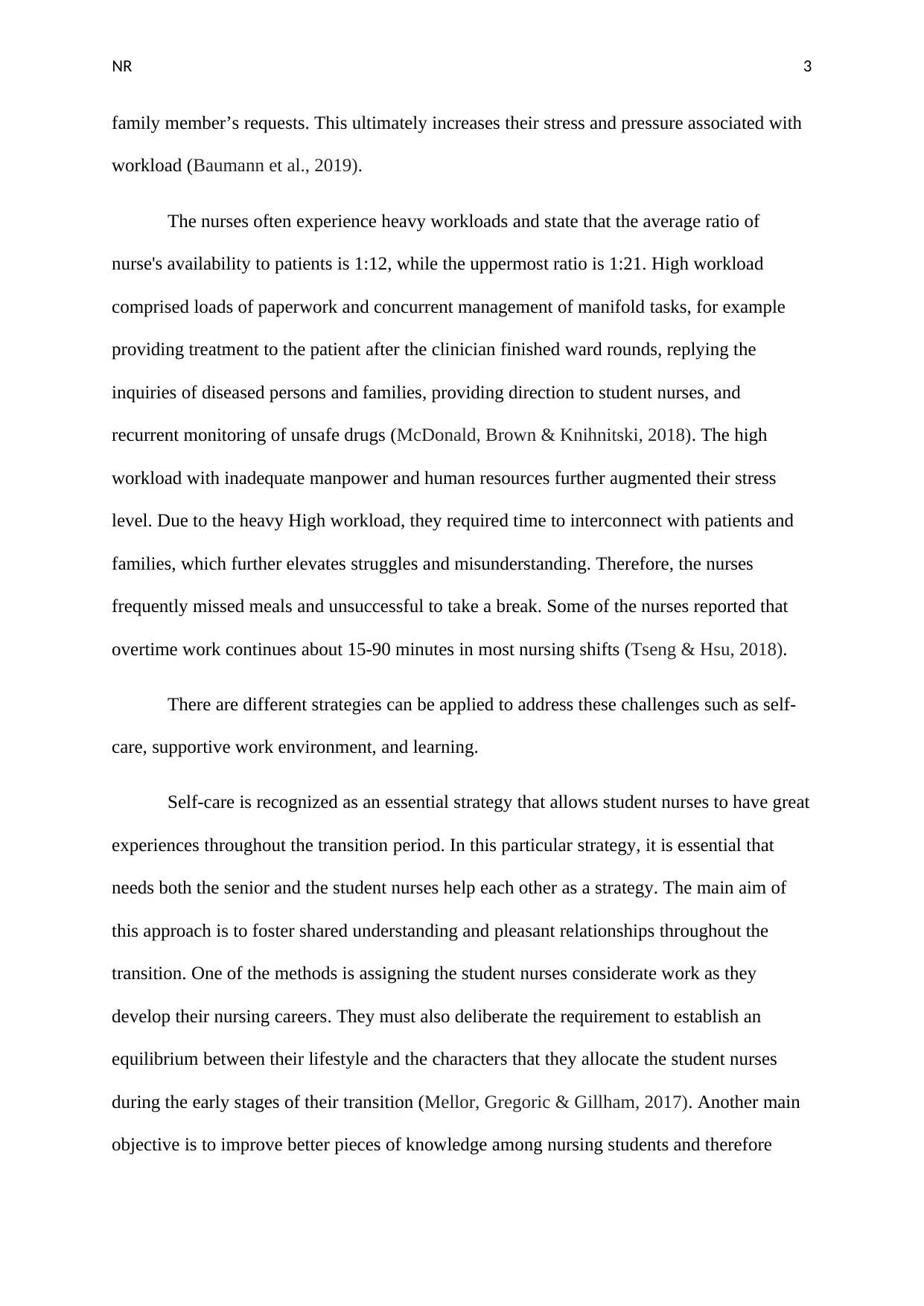
NR 3
family member’s requests. This ultimately increases their stress and pressure associated with
workload (Baumann et al., 2019).
The nurses often experience heavy workloads and state that the average ratio of
nurse's availability to patients is 1:12, while the uppermost ratio is 1:21. High workload
comprised loads of paperwork and concurrent management of manifold tasks, for example
providing treatment to the patient after the clinician finished ward rounds, replying the
inquiries of diseased persons and families, providing direction to student nurses, and
recurrent monitoring of unsafe drugs (McDonald, Brown & Knihnitski, 2018). The high
workload with inadequate manpower and human resources further augmented their stress
level. Due to the heavy High workload, they required time to interconnect with patients and
families, which further elevates struggles and misunderstanding. Therefore, the nurses
frequently missed meals and unsuccessful to take a break. Some of the nurses reported that
overtime work continues about 15-90 minutes in most nursing shifts (Tseng & Hsu, 2018).
There are different strategies can be applied to address these challenges such as self-
care, supportive work environment, and learning.
Self-care is recognized as an essential strategy that allows student nurses to have great
experiences throughout the transition period. In this particular strategy, it is essential that
needs both the senior and the student nurses help each other as a strategy. The main aim of
this approach is to foster shared understanding and pleasant relationships throughout the
transition. One of the methods is assigning the student nurses considerate work as they
develop their nursing careers. They must also deliberate the requirement to establish an
equilibrium between their lifestyle and the characters that they allocate the student nurses
during the early stages of their transition (Mellor, Gregoric & Gillham, 2017). Another main
objective is to improve better pieces of knowledge among nursing students and therefore
family member’s requests. This ultimately increases their stress and pressure associated with
workload (Baumann et al., 2019).
The nurses often experience heavy workloads and state that the average ratio of
nurse's availability to patients is 1:12, while the uppermost ratio is 1:21. High workload
comprised loads of paperwork and concurrent management of manifold tasks, for example
providing treatment to the patient after the clinician finished ward rounds, replying the
inquiries of diseased persons and families, providing direction to student nurses, and
recurrent monitoring of unsafe drugs (McDonald, Brown & Knihnitski, 2018). The high
workload with inadequate manpower and human resources further augmented their stress
level. Due to the heavy High workload, they required time to interconnect with patients and
families, which further elevates struggles and misunderstanding. Therefore, the nurses
frequently missed meals and unsuccessful to take a break. Some of the nurses reported that
overtime work continues about 15-90 minutes in most nursing shifts (Tseng & Hsu, 2018).
There are different strategies can be applied to address these challenges such as self-
care, supportive work environment, and learning.
Self-care is recognized as an essential strategy that allows student nurses to have great
experiences throughout the transition period. In this particular strategy, it is essential that
needs both the senior and the student nurses help each other as a strategy. The main aim of
this approach is to foster shared understanding and pleasant relationships throughout the
transition. One of the methods is assigning the student nurses considerate work as they
develop their nursing careers. They must also deliberate the requirement to establish an
equilibrium between their lifestyle and the characters that they allocate the student nurses
during the early stages of their transition (Mellor, Gregoric & Gillham, 2017). Another main
objective is to improve better pieces of knowledge among nursing students and therefore
Paraphrase This Document
Need a fresh take? Get an instant paraphrase of this document with our AI Paraphraser
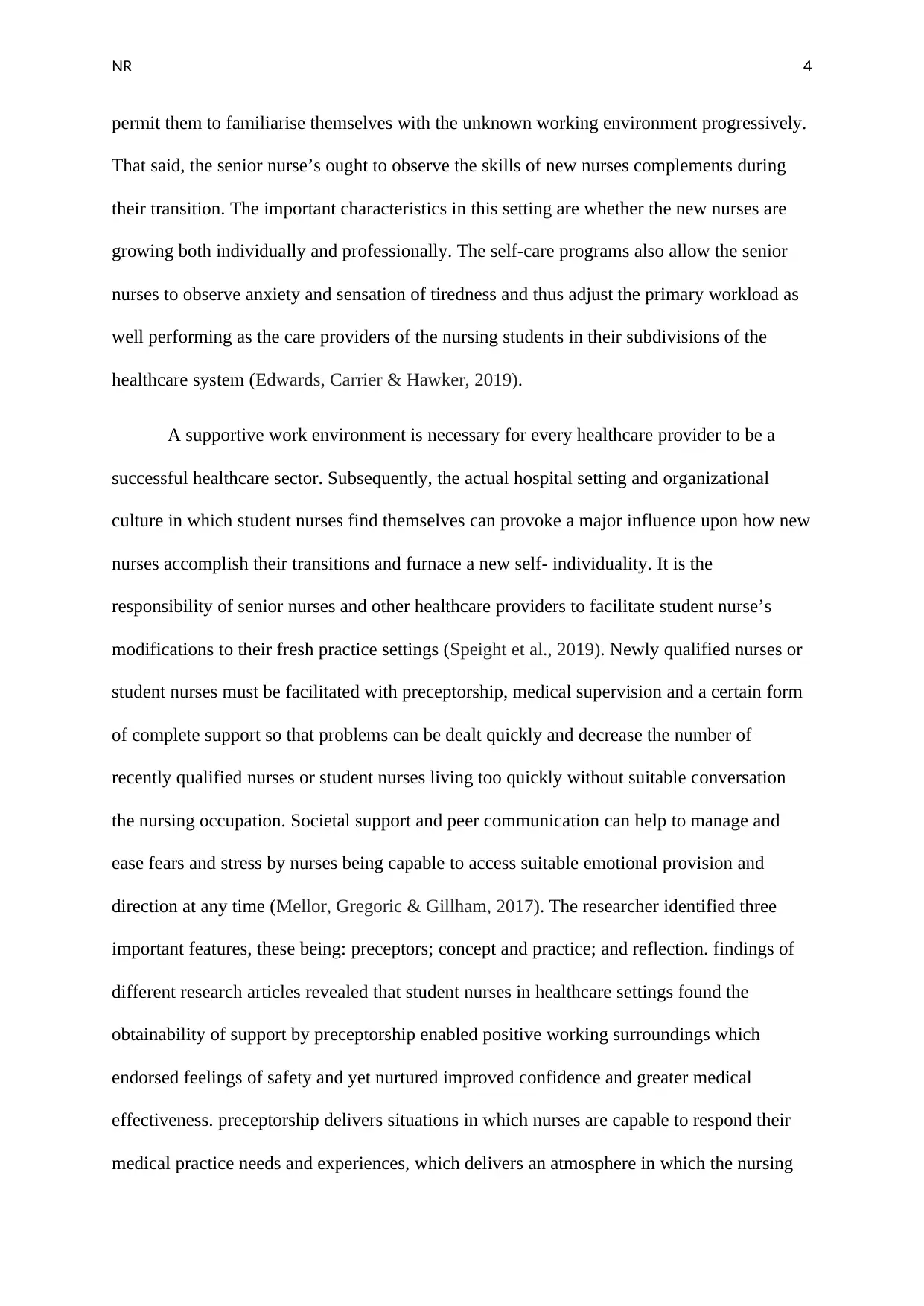
NR 4
permit them to familiarise themselves with the unknown working environment progressively.
That said, the senior nurse’s ought to observe the skills of new nurses complements during
their transition. The important characteristics in this setting are whether the new nurses are
growing both individually and professionally. The self-care programs also allow the senior
nurses to observe anxiety and sensation of tiredness and thus adjust the primary workload as
well performing as the care providers of the nursing students in their subdivisions of the
healthcare system (Edwards, Carrier & Hawker, 2019).
A supportive work environment is necessary for every healthcare provider to be a
successful healthcare sector. Subsequently, the actual hospital setting and organizational
culture in which student nurses find themselves can provoke a major influence upon how new
nurses accomplish their transitions and furnace a new self- individuality. It is the
responsibility of senior nurses and other healthcare providers to facilitate student nurse’s
modifications to their fresh practice settings (Speight et al., 2019). Newly qualified nurses or
student nurses must be facilitated with preceptorship, medical supervision and a certain form
of complete support so that problems can be dealt quickly and decrease the number of
recently qualified nurses or student nurses living too quickly without suitable conversation
the nursing occupation. Societal support and peer communication can help to manage and
ease fears and stress by nurses being capable to access suitable emotional provision and
direction at any time (Mellor, Gregoric & Gillham, 2017). The researcher identified three
important features, these being: preceptors; concept and practice; and reflection. findings of
different research articles revealed that student nurses in healthcare settings found the
obtainability of support by preceptorship enabled positive working surroundings which
endorsed feelings of safety and yet nurtured improved confidence and greater medical
effectiveness. preceptorship delivers situations in which nurses are capable to respond their
medical practice needs and experiences, which delivers an atmosphere in which the nursing
permit them to familiarise themselves with the unknown working environment progressively.
That said, the senior nurse’s ought to observe the skills of new nurses complements during
their transition. The important characteristics in this setting are whether the new nurses are
growing both individually and professionally. The self-care programs also allow the senior
nurses to observe anxiety and sensation of tiredness and thus adjust the primary workload as
well performing as the care providers of the nursing students in their subdivisions of the
healthcare system (Edwards, Carrier & Hawker, 2019).
A supportive work environment is necessary for every healthcare provider to be a
successful healthcare sector. Subsequently, the actual hospital setting and organizational
culture in which student nurses find themselves can provoke a major influence upon how new
nurses accomplish their transitions and furnace a new self- individuality. It is the
responsibility of senior nurses and other healthcare providers to facilitate student nurse’s
modifications to their fresh practice settings (Speight et al., 2019). Newly qualified nurses or
student nurses must be facilitated with preceptorship, medical supervision and a certain form
of complete support so that problems can be dealt quickly and decrease the number of
recently qualified nurses or student nurses living too quickly without suitable conversation
the nursing occupation. Societal support and peer communication can help to manage and
ease fears and stress by nurses being capable to access suitable emotional provision and
direction at any time (Mellor, Gregoric & Gillham, 2017). The researcher identified three
important features, these being: preceptors; concept and practice; and reflection. findings of
different research articles revealed that student nurses in healthcare settings found the
obtainability of support by preceptorship enabled positive working surroundings which
endorsed feelings of safety and yet nurtured improved confidence and greater medical
effectiveness. preceptorship delivers situations in which nurses are capable to respond their
medical practice needs and experiences, which delivers an atmosphere in which the nursing
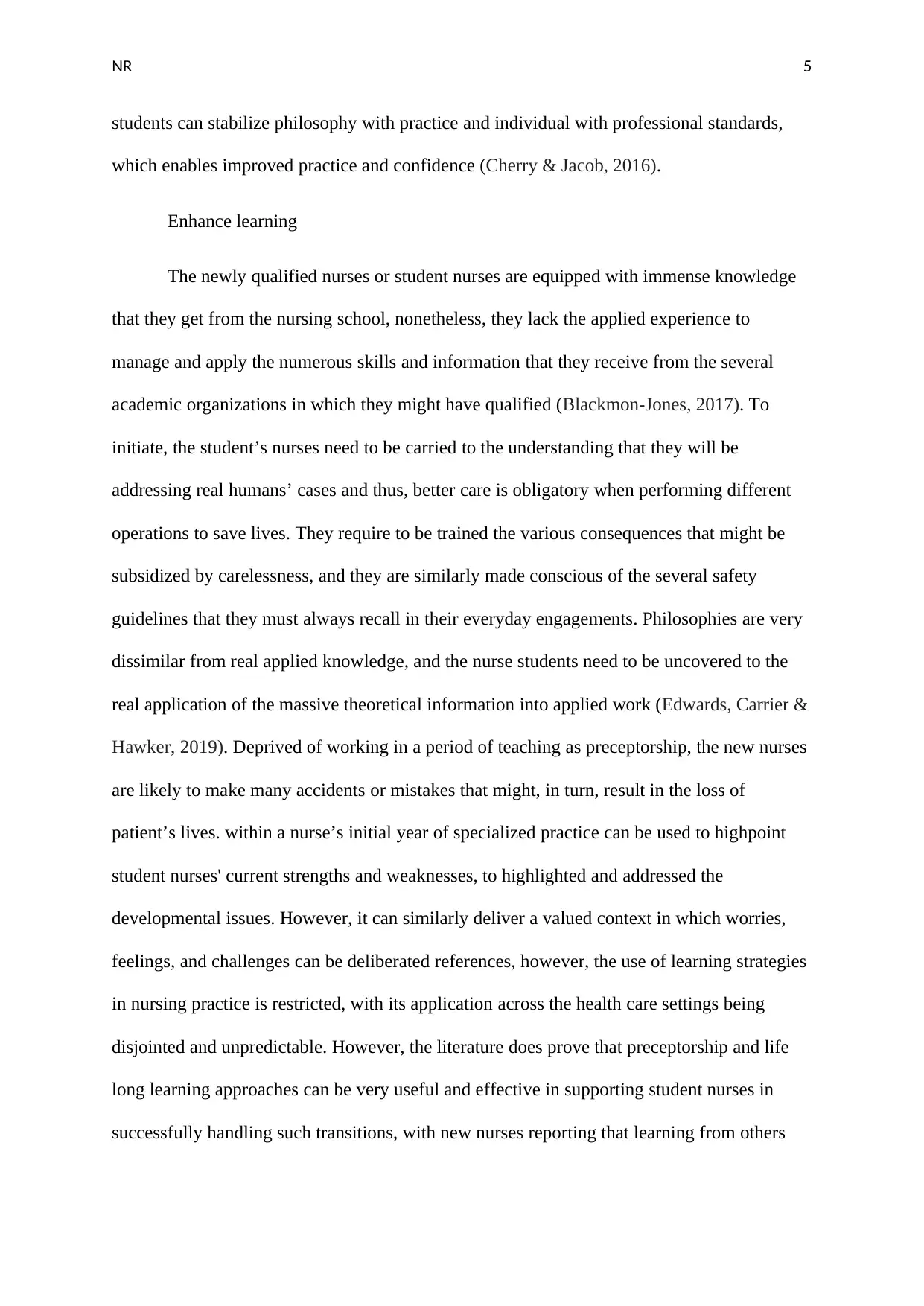
NR 5
students can stabilize philosophy with practice and individual with professional standards,
which enables improved practice and confidence (Cherry & Jacob, 2016).
Enhance learning
The newly qualified nurses or student nurses are equipped with immense knowledge
that they get from the nursing school, nonetheless, they lack the applied experience to
manage and apply the numerous skills and information that they receive from the several
academic organizations in which they might have qualified (Blackmon-Jones, 2017). To
initiate, the student’s nurses need to be carried to the understanding that they will be
addressing real humans’ cases and thus, better care is obligatory when performing different
operations to save lives. They require to be trained the various consequences that might be
subsidized by carelessness, and they are similarly made conscious of the several safety
guidelines that they must always recall in their everyday engagements. Philosophies are very
dissimilar from real applied knowledge, and the nurse students need to be uncovered to the
real application of the massive theoretical information into applied work (Edwards, Carrier &
Hawker, 2019). Deprived of working in a period of teaching as preceptorship, the new nurses
are likely to make many accidents or mistakes that might, in turn, result in the loss of
patient’s lives. within a nurse’s initial year of specialized practice can be used to highpoint
student nurses' current strengths and weaknesses, to highlighted and addressed the
developmental issues. However, it can similarly deliver a valued context in which worries,
feelings, and challenges can be deliberated references, however, the use of learning strategies
in nursing practice is restricted, with its application across the health care settings being
disjointed and unpredictable. However, the literature does prove that preceptorship and life
long learning approaches can be very useful and effective in supporting student nurses in
successfully handling such transitions, with new nurses reporting that learning from others
students can stabilize philosophy with practice and individual with professional standards,
which enables improved practice and confidence (Cherry & Jacob, 2016).
Enhance learning
The newly qualified nurses or student nurses are equipped with immense knowledge
that they get from the nursing school, nonetheless, they lack the applied experience to
manage and apply the numerous skills and information that they receive from the several
academic organizations in which they might have qualified (Blackmon-Jones, 2017). To
initiate, the student’s nurses need to be carried to the understanding that they will be
addressing real humans’ cases and thus, better care is obligatory when performing different
operations to save lives. They require to be trained the various consequences that might be
subsidized by carelessness, and they are similarly made conscious of the several safety
guidelines that they must always recall in their everyday engagements. Philosophies are very
dissimilar from real applied knowledge, and the nurse students need to be uncovered to the
real application of the massive theoretical information into applied work (Edwards, Carrier &
Hawker, 2019). Deprived of working in a period of teaching as preceptorship, the new nurses
are likely to make many accidents or mistakes that might, in turn, result in the loss of
patient’s lives. within a nurse’s initial year of specialized practice can be used to highpoint
student nurses' current strengths and weaknesses, to highlighted and addressed the
developmental issues. However, it can similarly deliver a valued context in which worries,
feelings, and challenges can be deliberated references, however, the use of learning strategies
in nursing practice is restricted, with its application across the health care settings being
disjointed and unpredictable. However, the literature does prove that preceptorship and life
long learning approaches can be very useful and effective in supporting student nurses in
successfully handling such transitions, with new nurses reporting that learning from others
⊘ This is a preview!⊘
Do you want full access?
Subscribe today to unlock all pages.

Trusted by 1+ million students worldwide
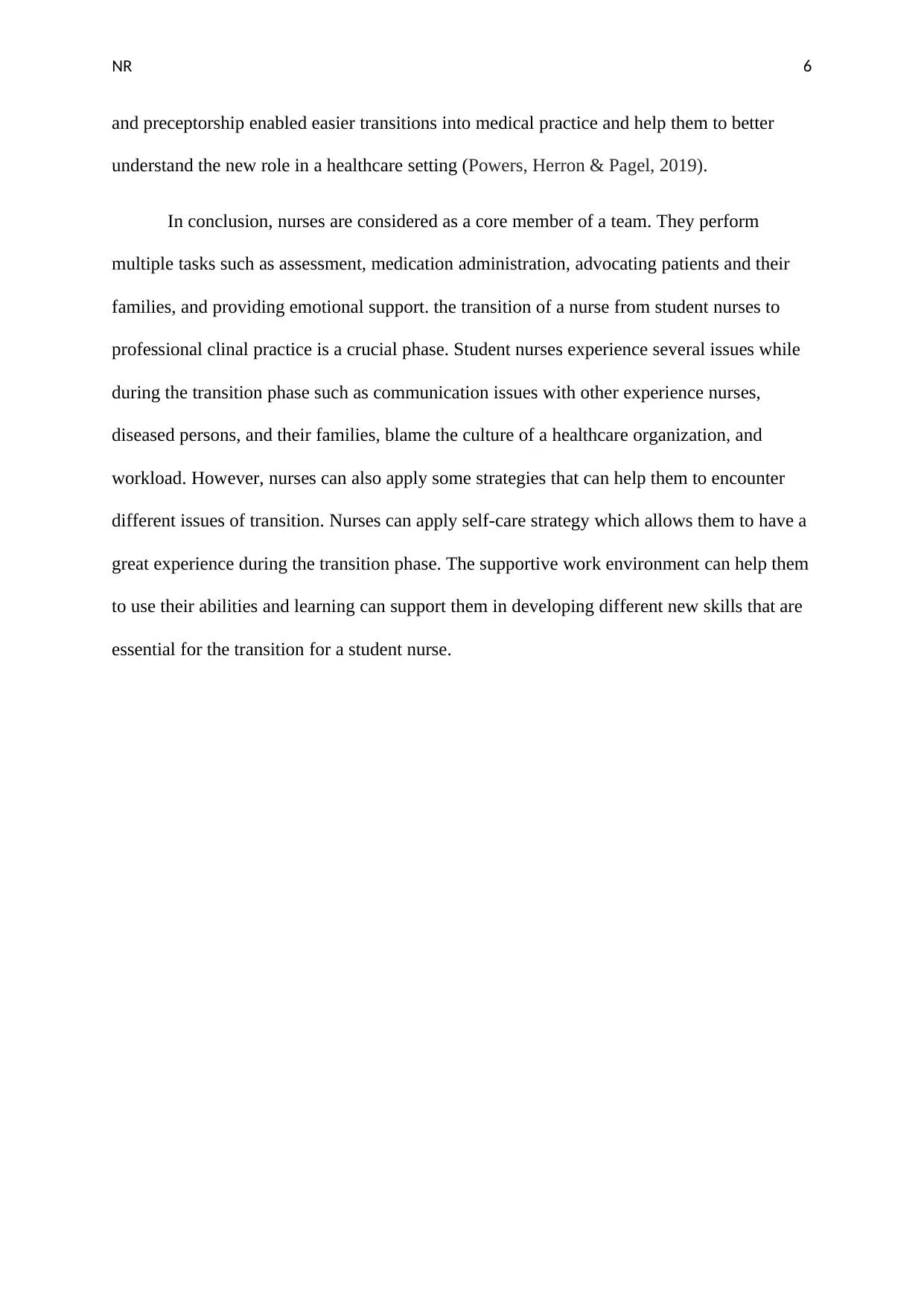
NR 6
and preceptorship enabled easier transitions into medical practice and help them to better
understand the new role in a healthcare setting (Powers, Herron & Pagel, 2019).
In conclusion, nurses are considered as a core member of a team. They perform
multiple tasks such as assessment, medication administration, advocating patients and their
families, and providing emotional support. the transition of a nurse from student nurses to
professional clinal practice is a crucial phase. Student nurses experience several issues while
during the transition phase such as communication issues with other experience nurses,
diseased persons, and their families, blame the culture of a healthcare organization, and
workload. However, nurses can also apply some strategies that can help them to encounter
different issues of transition. Nurses can apply self-care strategy which allows them to have a
great experience during the transition phase. The supportive work environment can help them
to use their abilities and learning can support them in developing different new skills that are
essential for the transition for a student nurse.
and preceptorship enabled easier transitions into medical practice and help them to better
understand the new role in a healthcare setting (Powers, Herron & Pagel, 2019).
In conclusion, nurses are considered as a core member of a team. They perform
multiple tasks such as assessment, medication administration, advocating patients and their
families, and providing emotional support. the transition of a nurse from student nurses to
professional clinal practice is a crucial phase. Student nurses experience several issues while
during the transition phase such as communication issues with other experience nurses,
diseased persons, and their families, blame the culture of a healthcare organization, and
workload. However, nurses can also apply some strategies that can help them to encounter
different issues of transition. Nurses can apply self-care strategy which allows them to have a
great experience during the transition phase. The supportive work environment can help them
to use their abilities and learning can support them in developing different new skills that are
essential for the transition for a student nurse.
Paraphrase This Document
Need a fresh take? Get an instant paraphrase of this document with our AI Paraphraser
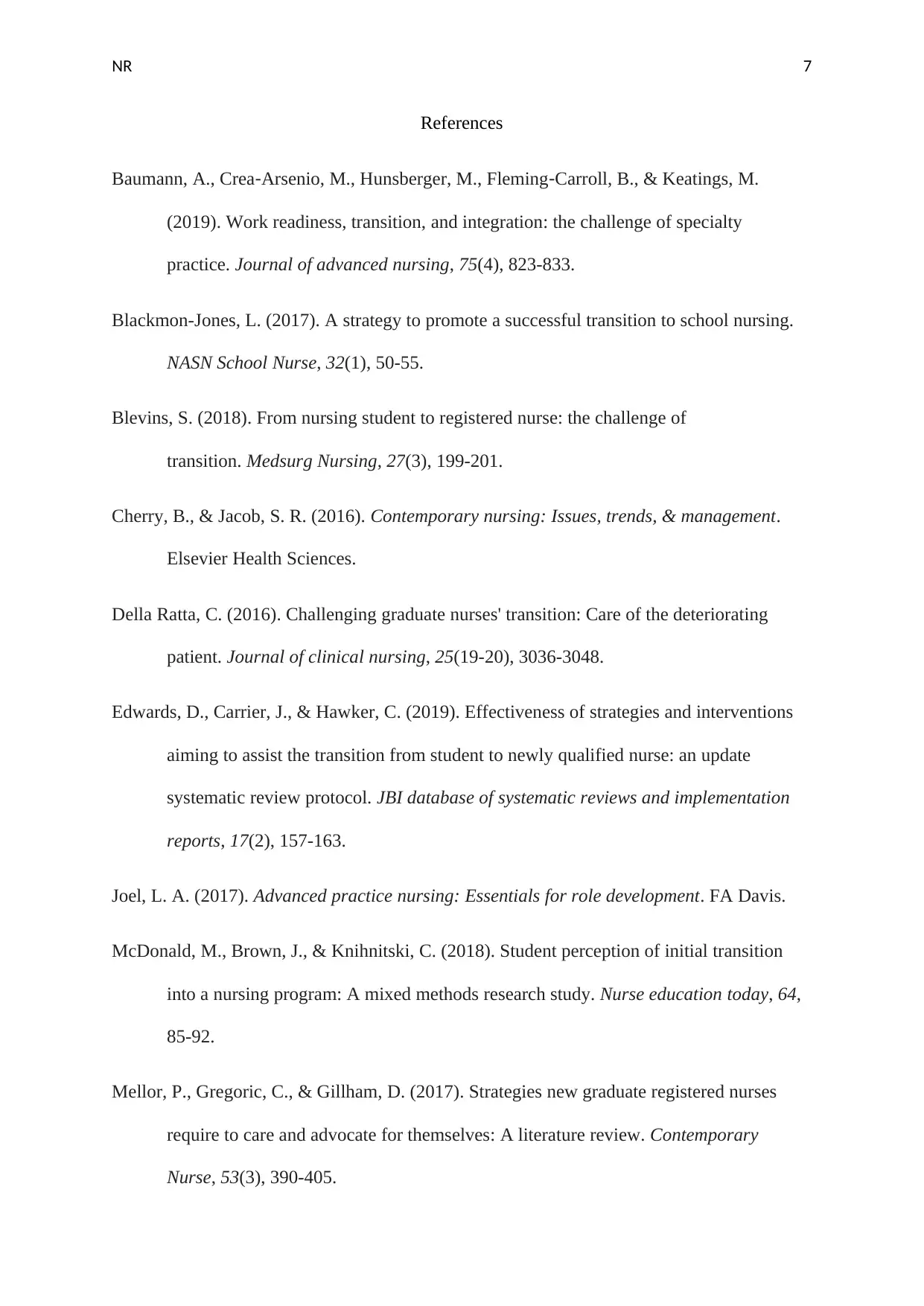
NR 7
References
Baumann, A., Crea‐Arsenio, M., Hunsberger, M., Fleming‐Carroll, B., & Keatings, M.
(2019). Work readiness, transition, and integration: the challenge of specialty
practice. Journal of advanced nursing, 75(4), 823-833.
Blackmon-Jones, L. (2017). A strategy to promote a successful transition to school nursing.
NASN School Nurse, 32(1), 50-55.
Blevins, S. (2018). From nursing student to registered nurse: the challenge of
transition. Medsurg Nursing, 27(3), 199-201.
Cherry, B., & Jacob, S. R. (2016). Contemporary nursing: Issues, trends, & management.
Elsevier Health Sciences.
Della Ratta, C. (2016). Challenging graduate nurses' transition: Care of the deteriorating
patient. Journal of clinical nursing, 25(19-20), 3036-3048.
Edwards, D., Carrier, J., & Hawker, C. (2019). Effectiveness of strategies and interventions
aiming to assist the transition from student to newly qualified nurse: an update
systematic review protocol. JBI database of systematic reviews and implementation
reports, 17(2), 157-163.
Joel, L. A. (2017). Advanced practice nursing: Essentials for role development. FA Davis.
McDonald, M., Brown, J., & Knihnitski, C. (2018). Student perception of initial transition
into a nursing program: A mixed methods research study. Nurse education today, 64,
85-92.
Mellor, P., Gregoric, C., & Gillham, D. (2017). Strategies new graduate registered nurses
require to care and advocate for themselves: A literature review. Contemporary
Nurse, 53(3), 390-405.
References
Baumann, A., Crea‐Arsenio, M., Hunsberger, M., Fleming‐Carroll, B., & Keatings, M.
(2019). Work readiness, transition, and integration: the challenge of specialty
practice. Journal of advanced nursing, 75(4), 823-833.
Blackmon-Jones, L. (2017). A strategy to promote a successful transition to school nursing.
NASN School Nurse, 32(1), 50-55.
Blevins, S. (2018). From nursing student to registered nurse: the challenge of
transition. Medsurg Nursing, 27(3), 199-201.
Cherry, B., & Jacob, S. R. (2016). Contemporary nursing: Issues, trends, & management.
Elsevier Health Sciences.
Della Ratta, C. (2016). Challenging graduate nurses' transition: Care of the deteriorating
patient. Journal of clinical nursing, 25(19-20), 3036-3048.
Edwards, D., Carrier, J., & Hawker, C. (2019). Effectiveness of strategies and interventions
aiming to assist the transition from student to newly qualified nurse: an update
systematic review protocol. JBI database of systematic reviews and implementation
reports, 17(2), 157-163.
Joel, L. A. (2017). Advanced practice nursing: Essentials for role development. FA Davis.
McDonald, M., Brown, J., & Knihnitski, C. (2018). Student perception of initial transition
into a nursing program: A mixed methods research study. Nurse education today, 64,
85-92.
Mellor, P., Gregoric, C., & Gillham, D. (2017). Strategies new graduate registered nurses
require to care and advocate for themselves: A literature review. Contemporary
Nurse, 53(3), 390-405.
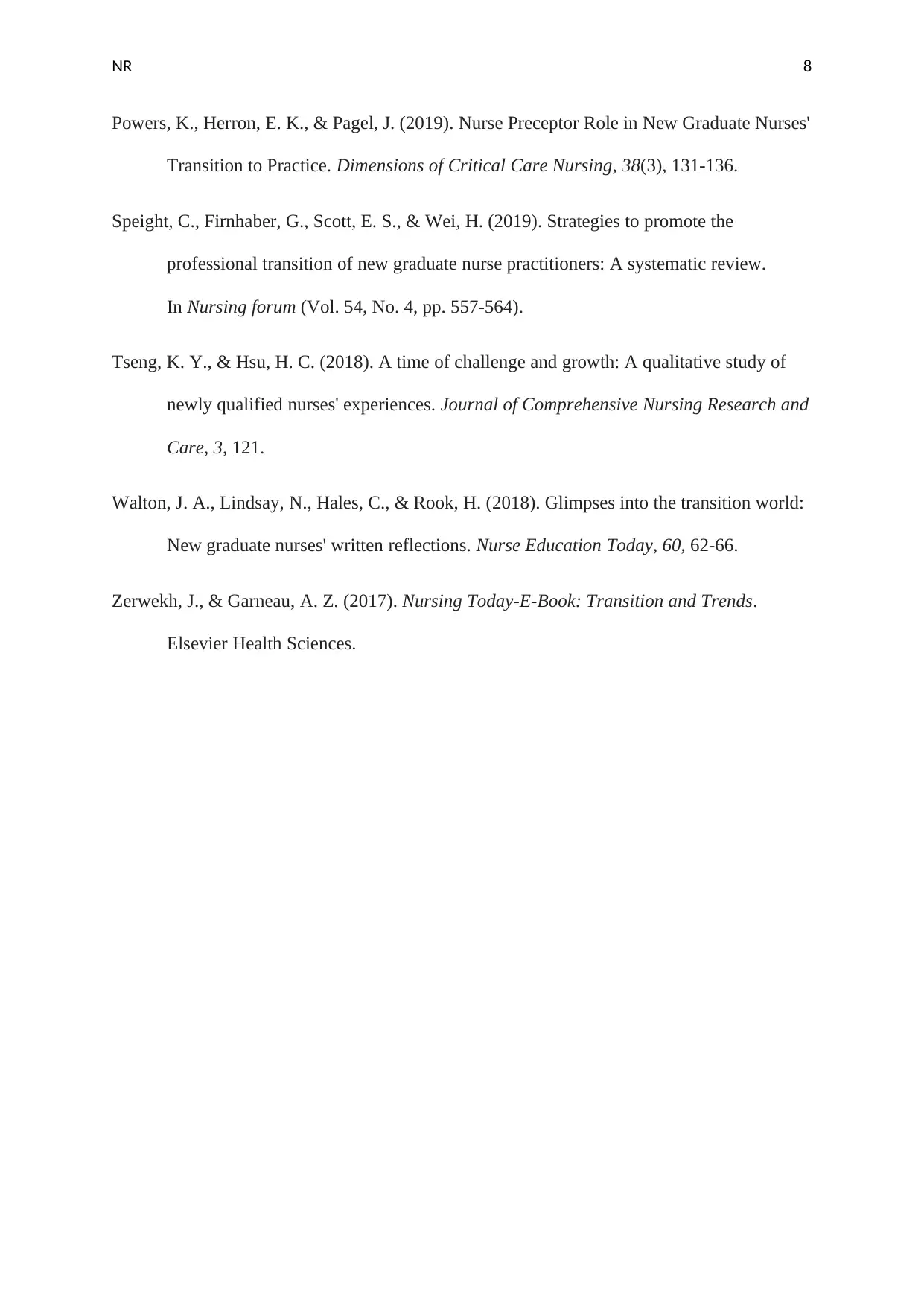
NR 8
Powers, K., Herron, E. K., & Pagel, J. (2019). Nurse Preceptor Role in New Graduate Nurses'
Transition to Practice. Dimensions of Critical Care Nursing, 38(3), 131-136.
Speight, C., Firnhaber, G., Scott, E. S., & Wei, H. (2019). Strategies to promote the
professional transition of new graduate nurse practitioners: A systematic review.
In Nursing forum (Vol. 54, No. 4, pp. 557-564).
Tseng, K. Y., & Hsu, H. C. (2018). A time of challenge and growth: A qualitative study of
newly qualified nurses' experiences. Journal of Comprehensive Nursing Research and
Care, 3, 121.
Walton, J. A., Lindsay, N., Hales, C., & Rook, H. (2018). Glimpses into the transition world:
New graduate nurses' written reflections. Nurse Education Today, 60, 62-66.
Zerwekh, J., & Garneau, A. Z. (2017). Nursing Today-E-Book: Transition and Trends.
Elsevier Health Sciences.
Powers, K., Herron, E. K., & Pagel, J. (2019). Nurse Preceptor Role in New Graduate Nurses'
Transition to Practice. Dimensions of Critical Care Nursing, 38(3), 131-136.
Speight, C., Firnhaber, G., Scott, E. S., & Wei, H. (2019). Strategies to promote the
professional transition of new graduate nurse practitioners: A systematic review.
In Nursing forum (Vol. 54, No. 4, pp. 557-564).
Tseng, K. Y., & Hsu, H. C. (2018). A time of challenge and growth: A qualitative study of
newly qualified nurses' experiences. Journal of Comprehensive Nursing Research and
Care, 3, 121.
Walton, J. A., Lindsay, N., Hales, C., & Rook, H. (2018). Glimpses into the transition world:
New graduate nurses' written reflections. Nurse Education Today, 60, 62-66.
Zerwekh, J., & Garneau, A. Z. (2017). Nursing Today-E-Book: Transition and Trends.
Elsevier Health Sciences.
⊘ This is a preview!⊘
Do you want full access?
Subscribe today to unlock all pages.

Trusted by 1+ million students worldwide
1 out of 9
Related Documents
Your All-in-One AI-Powered Toolkit for Academic Success.
+13062052269
info@desklib.com
Available 24*7 on WhatsApp / Email
![[object Object]](/_next/static/media/star-bottom.7253800d.svg)
Unlock your academic potential
Copyright © 2020–2026 A2Z Services. All Rights Reserved. Developed and managed by ZUCOL.





